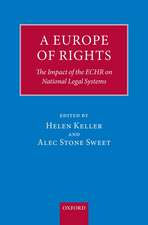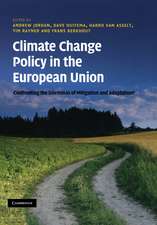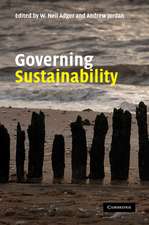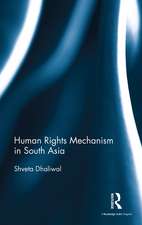Dismantling Public Policy: Preferences, Strategies, and Effects
Editat de Michael W. Bauer, Christoffer Green-Pedersen, Adrienne Héritier, Andrew Jordanen Limba Engleză Paperback – 17 iul 2014
| Toate formatele și edițiile | Preț | Express |
|---|---|---|
| Paperback (1) | 350.25 lei 31-37 zile | |
| Oxford University Press – 17 iul 2014 | 350.25 lei 31-37 zile | |
| Hardback (1) | 832.62 lei 31-37 zile | |
| OUP OXFORD – 13 dec 2012 | 832.62 lei 31-37 zile |
Preț: 350.25 lei
Preț vechi: 408.53 lei
-14% Nou
Puncte Express: 525
Preț estimativ în valută:
67.02€ • 70.15$ • 55.78£
67.02€ • 70.15$ • 55.78£
Carte tipărită la comandă
Livrare economică 19-25 martie
Preluare comenzi: 021 569.72.76
Specificații
ISBN-13: 9780198714781
ISBN-10: 0198714785
Pagini: 248
Ilustrații: graphs (black and white)
Dimensiuni: 156 x 234 x 14 mm
Greutate: 0.37 kg
Editura: Oxford University Press
Colecția OUP Oxford
Locul publicării:Oxford, United Kingdom
ISBN-10: 0198714785
Pagini: 248
Ilustrații: graphs (black and white)
Dimensiuni: 156 x 234 x 14 mm
Greutate: 0.37 kg
Editura: Oxford University Press
Colecția OUP Oxford
Locul publicării:Oxford, United Kingdom
Recenzii
`Policy dismantling is a subject which has been studied before but only in a few countries and sectors and without ever arriving at definitive conclusions about the forces, actions and patterns of policy-making behaviour which result in or lead to this type of policy change. This excellent collection of articles by leading policy scholars moves this discussion forward through case study and comparative analyses of instances of policy termination in North America and Europe. It distinguishes between cases of active dismantling, largely symbolic terminations and 'dismantling by default' when policies are simply allowed to lapse, and in so doing helps to bring order and clarity to this important aspect of public policy-making.'Michael Howlett, Burnaby Mountain Professor, Simon Fraser University
`n this, the first book of its kind, a team of distinguished scholars looks seriously at cases of policy retrenchment or elimination. They find that political leaders find many benefits in cutting, that social actors do not necessarily erupt in protest, and that policies are indeed routinely dismantled in many countries. The book charts a new course towards a theory of policy change that would encompass both the creation of new programs as well as the elimination of old ones. One cannot have one without the other. And we cannot have a theory of policy change without a theory of policy elimination'Frank R. Baumgartner, Distinguished Professor of Political Science, University of North Carolina at Chapel Hill
`This is a terrific book about an extraordinarily important and woefully under-theorized topic - when and how politicians try to dismantle policies in place, and what determines their success or failure in doing so. The authors provide a useful conceptual framework for understanding the micro-foundations and strategic options for dismantling as well as assessing its impact across policy sectors. In addition, the rich case studies in Dismantling Public Policy make the volume "state of the art" in comparative policy research. As austerity concerns become ever more central to policymaking in western industrial societies, the analysis in this volume will provide theoretical and methodological guidance to researchers for years to come.'R. Kent Weaver, Georgetown University and the Brookings Institution
`n this, the first book of its kind, a team of distinguished scholars looks seriously at cases of policy retrenchment or elimination. They find that political leaders find many benefits in cutting, that social actors do not necessarily erupt in protest, and that policies are indeed routinely dismantled in many countries. The book charts a new course towards a theory of policy change that would encompass both the creation of new programs as well as the elimination of old ones. One cannot have one without the other. And we cannot have a theory of policy change without a theory of policy elimination'Frank R. Baumgartner, Distinguished Professor of Political Science, University of North Carolina at Chapel Hill
`This is a terrific book about an extraordinarily important and woefully under-theorized topic - when and how politicians try to dismantle policies in place, and what determines their success or failure in doing so. The authors provide a useful conceptual framework for understanding the micro-foundations and strategic options for dismantling as well as assessing its impact across policy sectors. In addition, the rich case studies in Dismantling Public Policy make the volume "state of the art" in comparative policy research. As austerity concerns become ever more central to policymaking in western industrial societies, the analysis in this volume will provide theoretical and methodological guidance to researchers for years to come.'R. Kent Weaver, Georgetown University and the Brookings Institution
Notă biografică
Michael W. Bauer works on issues of European and multilevel public administration and is interested in comparative public policy analysis in particular in the European Union. He is Professor of Politics and Public Administration at the Humboldt-Universität zu Berlin, Germany.Andrew Jordan is interested in the governance of environmental problems in different context, but specially the European Union. He is Professor of Environmental Politics in the Tyndall Centre for Climate Change Research, School of Environmental Sciences, University of East Anglia, United Kingdom.Christoffer Green-Pedersen has a long-time interest in the comparative politics of welfare state reforms. His recent research focuses on comparative political agenda-setting. He is Professor of Public Policy at the Department of Political Science, Aarhus University.Adrienne Héritier's research extends to theories of institutional change in the European Union, comparative public policy, European policy making, Europeanization, regulation and new modes of governance. She is Professor of political science in the Dept of Political and Social Science and the Robert Schuman Center for Advanced Studies, European University Institute, Florence.

























